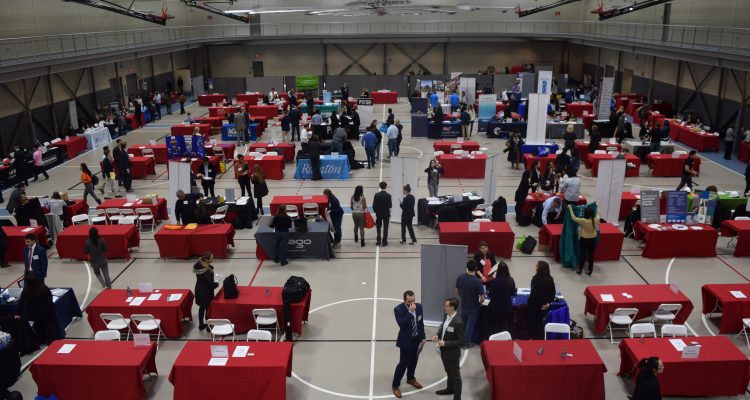Each semester, Fairfield University students have the opportunity to engage with businesses and network themselves at the Career and Internship Fair. This year’s Career and Internship Fair was held on Wednesday, Feb. 27 in the Leslie C. Quick Jr. Recreation Complex fieldhouse. For many students, the event is a great place to jumpstart their career in their field of choice.
“I hope that my freshman and sophomore students feel comfortable going in and talking to employers about opportunities. With juniors and seniors, I hope they start to feel confident with themselves and with talking about themselves. Ultimately, I hope that they get jobs and internships. If they don’t get tangible internships, you want to see this as a networking event,” said Stephanie Gallo, director of Career Planning for the College of Arts & Sciences.
The Career and Internship Fair can certainly yield great opportunities for students, especially those in the Charles F Dolan School of Business. Of the approximately 110 companies that attended the event, a majority were interested in students seeking degrees in the business school.
For example, 42 different companies and graduate programs were seeking accounting majors, 27 were seeking management majors and 30 were seeking students with any sort of business degree.
“I had five specific companies I planned on talking to at the career fair, but ended up talking to about 12,” said finance and economics double major Matthew Trewartha ‘21. “I felt that, as a student in the business school, there were a wide arrange of companies and opportunities at the Career & Internship Fair. I think that the school did a good job attracting companies for students in DSB. Many of the companies were actively recruiting accounting, finance, marketing and management majors.”
However, there was not quite as wide a variety of companies available at the event for students with non-business majors. For example, only four companies were seeking students with biology degrees, three were seeking students with chemistry degrees, one was seeking philosophy majors, and three were seeking politics majors.
This represents a large discrepancy between students who are seeking business degrees and those who are not. “The accounting firms come because we have a very prestigious accounting program, we get a lot of the same companies who have had really positive experiences, like Bigelow. We try to recruit new companies, but a lot of the bigger brands don’t need to go a career fair to get candidates. That’s really what students might need to be educated on, not all companies go to career fairs, and if they do they go to one, they go to a really big school,” said Gallo when asked about the discrepancy in major representation.
“It’s more about the types of industries we feel our students are interested in. We’re trying to get more companies that are marketing based, or public relations based. I know I hear a lot from journalism students or English students asking, ‘where are the journalism opportunities?’ That’s one of the examples of companies that just don’t recruit. But we have had places like Hooplaha come.”
Despite this discrepancy, the Career and Internship Fair can still be place for all students to make positive strides in their careers. Although many students have few companies seeking their exact major, 46 companies at the event, including the FBI, Bigelow and Vineyard Vines, were interested in students from all majors. Sophomore Andrew Murphy, majoring in English and Spanish, had a positive experience at the Career and Internship Fair despite the fact that he had four companies total seeking his majors.
“I felt that I had an abundance of opportunities. I felt that my interactions went pretty well once I got over my initial awkwardness,” said Murphy.
Furthermore, the Career and Internship Fair can be helpful even for those who are not able to land a job or an internship from the event. Gallo echoed this, saying the most important thing for students at the event are, “Learning how to research, learning how to talk about themselves, and then actually getting jobs and internships and practicing their networking skills.”
For students who do feel that they are underrepresented at the event, they are encouraged to attend the event in order to practice networking and give feedback. “We send a survey to every student who attends. We get about a 7 percent response rate,” said Gallo. Ultimately, more students attending the event and providing constructive feedback might help those students who feel they are underrepresented gain more opportunities.


Leave a Reply